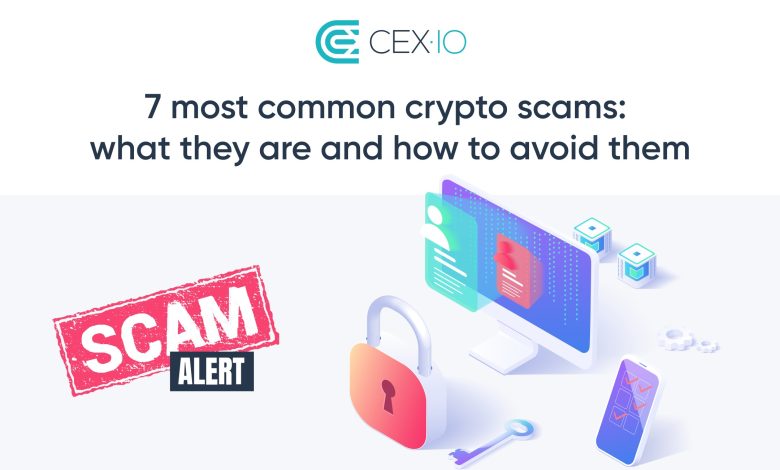Common Cryptocurrency Scams and How to Avoid Them

- Understanding the Risks: Common Cryptocurrency Scams
- Protecting Your Investments: Tips to Avoid Cryptocurrency Scams
- Spotting the Red Flags: Signs of a Cryptocurrency Scam
- Educate Yourself: How to Stay Safe in the World of Cryptocurrency
- Don’t Fall for It: Common Cryptocurrency Scams to Watch Out For
- Taking Control: Steps to Protect Yourself from Cryptocurrency Scams
Understanding the Risks: Common Cryptocurrency Scams
When it comes to investing in cryptocurrency, it is crucial to be aware of the risks associated with it. There are several common scams that investors should watch out for to protect their funds and investments. By understanding these risks, individuals can take steps to avoid falling victim to fraudulent schemes.
- One common cryptocurrency scam is phishing, where scammers send fake emails or messages pretending to be from legitimate companies to trick individuals into revealing their private keys or passwords. It is essential to always verify the source of any communication before sharing sensitive information.
- Another prevalent scam is Ponzi schemes, where fraudsters promise high returns on investments but use new investors’ money to pay off existing investors. Investors should be wary of any investment opportunity that seems too good to be true and do thorough research before committing funds.
- Malware is also a significant risk in the cryptocurrency world, with scammers using malicious software to steal private keys or access wallets. It is crucial to use reputable antivirus software and keep systems updated to protect against malware attacks.
- Impersonation scams involve scammers posing as celebrities or influencers on social media to promote fake giveaways or investment opportunities. Individuals should be cautious of any unsolicited messages and verify the legitimacy of offers before participating.
By being aware of these common cryptocurrency scams and taking proactive measures to protect investments, individuals can minimize the risk of falling victim to fraudulent schemes. It is essential to stay informed, exercise caution, and conduct thorough research before making any investment decisions in the cryptocurrency market.
Protecting Your Investments: Tips to Avoid Cryptocurrency Scams
When it comes to protecting your investments in the world of cryptocurrency, it is essential to be aware of the various scams that exist. By following some simple tips, you can avoid falling victim to these fraudulent schemes.
- Research Before Investing: Before putting your money into any cryptocurrency, take the time to research the project, team, and technology behind it. Look for reviews and feedback from other investors to get a sense of its legitimacy.
- Avoid Unrealistic Promises: Be wary of any investment opportunity that promises guaranteed returns or claims to make you rich quickly. Remember, if it sounds too good to be true, it probably is.
- Use Secure Wallets: Keep your cryptocurrency holdings safe by using reputable wallets that offer strong security features. Avoid storing large amounts of crypto on exchanges, as they are more vulnerable to hacks.
- Be Cautious of Phishing Attempts: Watch out for phishing emails and websites that mimic legitimate cryptocurrency platforms. Always double-check URLs and never share your private keys or passwords with anyone.
- Stay Informed: Keep yourself updated on the latest trends and news in the cryptocurrency space. By staying informed, you can better identify potential scams and protect your investments.
By following these tips and remaining vigilant, you can safeguard your investments and avoid falling prey to cryptocurrency scams. Remember, it’s always better to be safe than sorry when it comes to your hard-earned money.
Spotting the Red Flags: Signs of a Cryptocurrency Scam
When it comes to investing in cryptocurrencies, it’s crucial to be aware of the red flags that may indicate a potential scam. By knowing what to look out for, you can protect yourself from falling victim to fraudulent schemes. Here are some common signs that should raise a red flag:
- Guaranteed high returns: Be wary of any investment opportunity that promises guaranteed high returns with little to no risk. Remember, if it sounds too good to be true, it probably is.
- Unsolicited offers: If you receive unsolicited offers via email, social media, or phone calls promoting a new cryptocurrency, proceed with caution. Legitimate investments typically don’t need to resort to cold-calling.
- Pressure to act quickly: Scammers often use high-pressure tactics to push you into making a hasty decision. Take your time to research and verify the legitimacy of the investment opportunity.
- Lack of transparency: Legitimate cryptocurrency projects are transparent about their team, technology, and goals. If you can’t find clear information about the people behind the project or how it works, it’s a red flag.
- Pyramid or Ponzi schemes: Be cautious of investment schemes that rely on recruiting new investors to pay returns to existing ones. These schemes are unsustainable and often collapse, leaving investors with significant losses.
By staying vigilant and being aware of these red flags, you can avoid falling victim to cryptocurrency scams. Remember to always do your due diligence before investing in any cryptocurrency project and never hesitate to seek advice from financial professionals.
Educate Yourself: How to Stay Safe in the World of Cryptocurrency
It is crucial to educate yourself on how to stay safe in the world of cryptocurrency to avoid falling victim to scams. Here are some tips to help you navigate this complex landscape:
- Research before investing: Before putting your money into any cryptocurrency, make sure to thoroughly research the project, team, and technology behind it. Look for red flags such as lack of transparency or unrealistic promises.
- Use secure wallets: Store your cryptocurrencies in secure wallets that offer features like two-factor authentication and encryption. Avoid keeping large amounts of crypto on exchanges, as they are vulnerable to hacks.
- Be wary of phishing attempts: Scammers often use phishing emails or websites to trick people into revealing their private keys or login credentials. Always double-check the URL and never click on suspicious links.
- Avoid Ponzi schemes: Be cautious of schemes that promise high returns with little to no risk. Ponzi schemes rely on new investors’ money to pay returns to earlier investors and eventually collapse.
- Stay informed: Keep up to date with the latest news and developments in the cryptocurrency space. Follow reputable sources and forums to stay informed about potential scams and security threats.
By following these tips and staying vigilant, you can protect yourself from falling victim to common cryptocurrency scams. Remember, if something sounds too good to be true, it probably is. Stay safe and secure in your cryptocurrency investments.
Don’t Fall for It: Common Cryptocurrency Scams to Watch Out For
When it comes to investing in cryptocurrency, it’s important to be aware of the common scams that can occur in this space. By educating yourself on these scams, you can protect yourself from falling victim to fraudulent schemes. Here are some of the most prevalent cryptocurrency scams to watch out for:
- Phishing Scams: Phishing scams involve fraudulent emails or websites that mimic legitimate cryptocurrency exchanges or wallets. These scams are designed to trick individuals into providing their sensitive information, such as login credentials or private keys. To avoid falling for phishing scams, always double-check the URL of the website and never click on suspicious links.
- Ponzi Schemes: Ponzi schemes promise high returns on investment with little to no risk. However, these schemes rely on new investors’ money to pay returns to earlier investors, creating a cycle that eventually collapses. Be wary of any investment opportunity that sounds too good to be true and always do thorough research before investing.
- ICO Scams: Initial Coin Offerings (ICOs) can be a breeding ground for scams, as they are largely unregulated. Scammers may create fake ICOs to lure investors into contributing funds, only to disappear with the money. Before participating in an ICO, verify the legitimacy of the project and team behind it.
- Impersonation Scams: Impersonation scams involve individuals posing as celebrities or influential figures in the cryptocurrency space to deceive others into sending them cryptocurrency. Always verify the identity of the person you are interacting with online and never send cryptocurrency to someone you do not know personally.
- Malware: Malware can infect your computer or device and steal your cryptocurrency holdings. To protect yourself from malware, always use reputable antivirus software and be cautious when downloading files or clicking on links from unknown sources.
By staying informed and vigilant, you can avoid falling victim to these common cryptocurrency scams and protect your investments in the digital asset space.
Taking Control: Steps to Protect Yourself from Cryptocurrency Scams
Protecting yourself from cryptocurrency scams is crucial in the digital age. By taking control of your online security, you can minimize the risk of falling victim to fraudulent schemes. Here are some steps you can take to safeguard your investments:
- Research before investing: Before putting your money into any cryptocurrency project, make sure to conduct thorough research. Look into the team behind the project, read reviews from other investors, and check for any red flags.
- Use secure wallets: Store your cryptocurrencies in secure wallets that offer features like two-factor authentication and encryption. Avoid keeping large amounts of digital assets on exchanges, as they are more vulnerable to hacks.
- Be wary of phishing attempts: Scammers often use phishing emails and websites to trick users into revealing their private keys or login credentials. Always double-check the URL of any website you visit and never share sensitive information online.
- Stay informed: Keep yourself updated on the latest cryptocurrency scams and trends in the market. By staying informed, you can spot potential scams before they affect you and take appropriate action.
- Report suspicious activity: If you come across any suspicious activity or believe you have been targeted by a scam, report it to the relevant authorities. By reporting scams, you can help protect others from falling victim to the same schemes.



